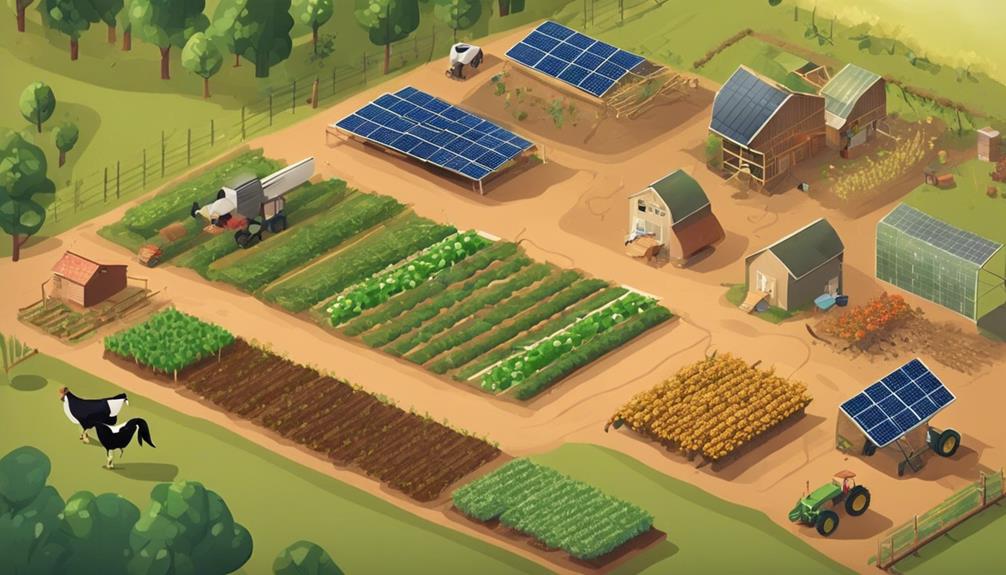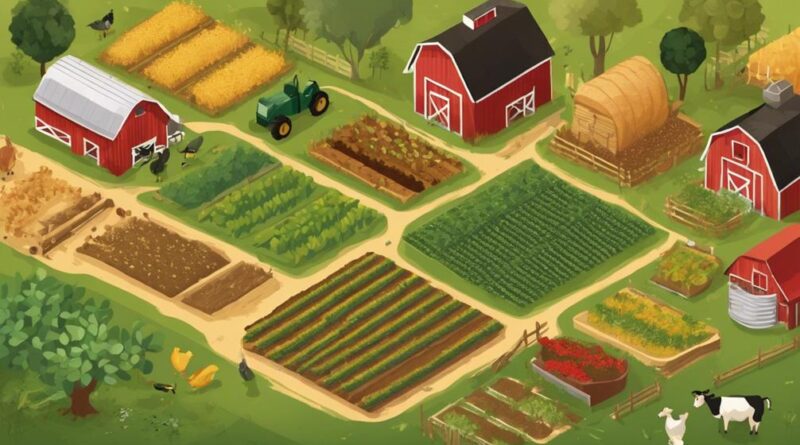Unlocking Benefits of Sustainable Farming: A How-To Guide
Unlock the numerous benefits of sustainable farming by reducing carbon emissions, improving soil health, and preserving biodiversity. Utilize water conservation techniques, implement climate resilience strategies, and enjoy cleaner, safer food production. Enhance economic viability, nurture community support, and tap into the full potential of sustainable agriculture. Embrace innovative practices and data-driven insights to optimize resource use and lead towards a more sustainable future.
Environmental Impact
Sustainable farming practices actively reduce carbon emissions and promote biodiversity, resulting in a healthier environment overall. By focusing on minimizing the carbon footprint, sustainable farming techniques play a crucial role in combating climate change. Traditional farming methods often involve the heavy use of fossil fuels for machinery, fertilizers, and transportation, leading to significant carbon emissions. In contrast, sustainable farming emphasizes renewable energy sources, reduced chemical inputs, and efficient land use, all of which contribute to lowering the carbon footprint of agricultural activities.
Moreover, sustainable farming practices create and maintain diverse wildlife habitats. By preserving natural landscapes, incorporating hedgerows, and implementing crop rotation systems, sustainable farming provides shelter and food sources for a variety of species. This not only supports the local ecosystem but also enhances biodiversity, which is essential for ecological resilience. Wildlife habitats within sustainable farms offer refuge to pollinators, birds, and beneficial insects, contributing to natural pest control and overall ecosystem balance.
In essence, the integration of sustainable farming practices not only reduces carbon emissions but also fosters the conservation of wildlife habitats. This dual benefit enhances the environmental sustainability of agricultural operations, making a positive impact on both the planet and its inhabitants.
Soil Health
To ensure the long-term viability of agricultural practices, optimizing soil health is imperative as it forms the foundation for sustainable farming systems. Proper soil management practices are crucial for enhancing soil regeneration and promoting efficient nutrient cycling.
Here are four key strategies to improve soil health:
- Cover Cropping: Introducing cover crops between cash crop seasons helps prevent soil erosion, retains moisture, and enhances soil fertility by adding organic matter back into the soil through decomposition processes.
- Crop Rotation: Implementing diverse crop rotations can break pest and disease cycles, improve soil structure, and prevent nutrient depletion by varying the nutrient needs of different crops.
- Reduced Tillage: Minimizing tillage practices helps maintain soil structure, reduce soil compaction, and preserve soil organic matter, fostering a healthier environment for beneficial soil organisms.
- Composting: Utilizing compost as a soil amendment enriches soil with essential nutrients, improves soil structure, and promotes microbial activity, leading to enhanced nutrient cycling and overall soil health.
Biodiversity Conservation
Enhancing biodiversity through strategic conservation practices is essential for bolstering ecosystem resilience and promoting sustainable agricultural systems. Promoting native species and implementing agroforestry techniques are key strategies to conserve biodiversity on farms.
Promoting native species involves cultivating plants that are indigenous to the region, which can enhance the overall biodiversity of the farm. Native plants are well-adapted to the local environment, providing habitat and food sources for native wildlife. By incorporating native species into your farming practices, you can create a more balanced and resilient ecosystem.
Agroforestry techniques, such as alley cropping or silvopasture, integrate trees and shrubs with crops or livestock. This approach not only increases biodiversity by providing habitat for a variety of species but also offers additional benefits such as improved soil health, water retention, and carbon sequestration. Agroforestry systems mimic natural ecosystems, promoting biodiversity while enhancing the overall sustainability of the farm.
Water Conservation
Implementing water-efficient irrigation practices is crucial for maximizing agricultural productivity while minimizing water usage on farms. By adopting innovative techniques, you can significantly reduce water wastage and promote sustainable water management.
Here are some key strategies to enhance water conservation on your farm:
- Drip Irrigation: This method delivers water directly to the roots of plants, minimizing evaporation and runoff. Studies show that drip irrigation can reduce water usage by up to 50% while increasing crop yield by 20%.
- Mulching: Applying mulch around plants helps retain soil moisture, reducing the need for frequent watering. This simple technique can save significant amounts of water over the growing season.
- Precision Irrigation: Using technology like soil moisture sensors and weather data, you can tailor irrigation schedules to meet the specific needs of your crops. Precision irrigation ensures that water is applied efficiently, avoiding overwatering.
- Rainwater Harvesting: Collecting rainwater from roofs or other surfaces for irrigation purposes is a sustainable way to supplement your water supply. Installing rain barrels or cisterns allows you to capture and store rainwater for later use, reducing reliance on groundwater or other sources.
Climate Resilience
Maximizing agricultural resilience to climate change requires strategic adaptation measures based on data-driven insights and innovative practices. Crop diversification and sustainable practices play a crucial role in enhancing climate resilience on farms. By planting a variety of crops instead of monocultures, farmers can spread risks associated with climate variability. Diverse crops have different tolerances to weather extremes, ensuring that even if one crop fails due to unfavorable conditions, others may thrive.
Climate adaptation strategies involve implementing regenerative techniques that help build soil health and increase its capacity to withstand climate-related challenges. Practices such as cover cropping, no-till farming, and agroforestry not only sequester carbon dioxide from the atmosphere but also improve soil structure, water retention, and nutrient cycling. These regenerative approaches contribute to the overall sustainability of the farm while enhancing its ability to adapt to changing climate patterns.
Furthermore, utilizing data-driven insights can guide farmers in making informed decisions regarding planting schedules, crop selection, and water management practices. By analyzing historical climate data, farmers can anticipate shifts in weather patterns and adjust their farming practices accordingly. Innovative technologies like precision agriculture tools and climate modeling software can provide valuable information to optimize resource use and increase resilience to climate change. Through a combination of crop diversification, sustainable practices, climate adaptation, and regenerative techniques, farmers can enhance their farms' resilience in the face of a changing climate.
Health Benefits
To further optimize the sustainability and resilience of your farm, exploring the potential health benefits associated with sustainable farming practices becomes a significant aspect of your agricultural strategy. Embracing sustainable farming methods not only benefits the environment but also contributes to enhancing the health and well-being of individuals consuming the produce.
Here are some key points highlighting the health benefits of sustainable farming:
- Nutritional Advantages: Sustainable farming practices often focus on enhancing soil health, which can lead to increased nutrient content in crops. Healthy soil rich in essential minerals and nutrients translates to more nutritious fruits and vegetables for consumption.
- Wellness Promotion: By avoiding the use of harmful chemicals and pesticides, sustainable farming promotes cleaner and safer food production. Consuming food grown through sustainable practices reduces exposure to potentially harmful substances, thus positively impacting overall health.
- Disease Prevention: Sustainable farming techniques like crop rotation and integrated pest management help reduce the incidence of pests and diseases. This leads to a decrease in the need for chemical interventions, resulting in cleaner and healthier produce.
- Enhanced Flavor and Freshness: Fresh, locally grown produce from sustainable farms often tastes better due to being harvested at peak ripeness. The shorter time between harvest and consumption retains more nutrients, ensuring a flavorful and nutrient-rich experience for consumers.
Economic Viability

Sustainable farming practices demonstrate a strong correlation between environmental stewardship and financial stability in agriculture. When considering economic viability, it's crucial to assess the cost efficiency and market demand associated with sustainable farming methods. Research indicates that sustainable farming practices can lead to significant cost savings in the long run. For example, practices such as crop rotation and integrated pest management reduce the need for chemical inputs, ultimately lowering production costs for farmers. Additionally, sustainable farming methods contribute to improved soil health, leading to higher yields and better crop resilience against environmental stressors.
Moreover, market demand plays a pivotal role in the economic viability of sustainable farming. Consumers are increasingly seeking out products that are produced ethically and sustainably. This shift in consumer preferences has created a growing market for sustainably grown produce and livestock. Farmers who adopt sustainable practices are well-positioned to capitalize on this trend and command premium prices for their products. By aligning production methods with market demand, farmers can't only improve their economic viability but also contribute to a more sustainable food system.
Community Support
The correlation between sustainable farming practices and economic viability extends beyond financial stability to encompass strong community support for agricultural initiatives. Building a network of local partnerships and engaging in volunteer initiatives can significantly enhance the impact and success of sustainable farming practices.
Here are four key ways in which community support can benefit sustainable farming:
- Access to Resources: By establishing local partnerships with businesses, community organizations, and government agencies, sustainable farmers can gain access to essential resources such as land, equipment, and funding opportunities.
- Knowledge Sharing: Engaging with the community through volunteer initiatives allows for the exchange of knowledge and expertise. This can lead to innovative solutions, improved farming techniques, and increased productivity.
- Market Expansion: Collaborating with local partners can help sustainable farmers access new markets and distribution channels. By working together, farmers can reach a wider customer base and increase the demand for their products.
- Resilience and Support: Building a strong community network provides sustainable farmers with resilience in the face of challenges. In times of need, such as natural disasters or market fluctuations, having a supportive community can offer assistance and solidarity.
Through fostering local partnerships and engaging in volunteer initiatives, sustainable farmers can cultivate a thriving community that supports and sustains their agricultural endeavors.
Conclusion
In conclusion, adopting sustainable farming practices not only benefits the environment but also improves soil health, conserves biodiversity, and enhances water conservation. By prioritizing climate resilience and promoting community support, sustainable farming offers a holistic approach to agriculture.
The health benefits and economic viability of sustainable farming further underscore its importance in ensuring a sustainable future for generations to come. Embracing sustainable farming practices isn't just a choice, it's a necessity for a thriving and resilient agricultural sector.
